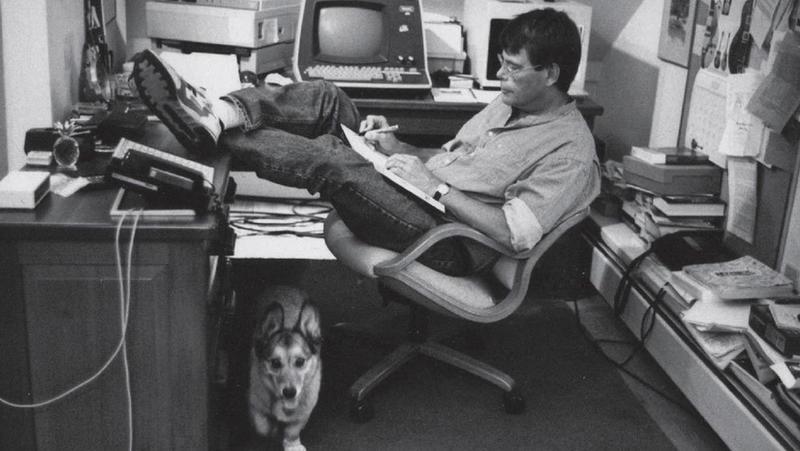Stephen King's Wife Dug 'Carrie' Out Of The Trash And Made Him Finish It
By | September 12, 2022

Carrie, Stephen King’s debut novel from 1974, tells the story of a high school student whose telekinetic abilities manifest themselves in horrific ways after she becomes a woman. She’s taunted by bullies, her mother over-shelters her to the point of abuse, and everyone who gets in Carrie’s way ends up on the wrong end of her psychic abilities.
King wrote Carrie while he was was working as high school teacher, but initially threw away the pages thinking they were awful. Fortunately, for horror fans, his wife dug them out of the waste basket and told him to keep writing. Tabitha King’s insistence that her husband keep writing started his career, and changed their lives monumentally.
Stephen And Tabitha King Are Both Writers, But Only One Of Them Had A Typewriter

The King family was broke in the early ‘70s. Both Stephen and Tabitha came from lower class families, and in fact they were so poor that King had to borrow a suit and tie for their wedding. Even though they were both writers only Tabitha had a typewriter, which King used to peck out his books in his spare time.
The Kings, now with two children, were living in a double-wide trailer and barely making ends meet at the time. Even though they’re both authors in their own right, they just didn’t have the money for two typewriters. In 2003, when asked if he marred Tabitha solely because of her typewriter, King responded:
That’s only partly true. I married her because I loved her and because we got on as well out of bed as in it. The typewriter was a factor, though.
King’s Biggest Accomplishment At The Time Was Being Published In Nudie Mags

Writing is hard work, but the most exhausting thing about being an author wading through the pile of rejections and hoping for a glimmer of hope. By 1973 King had written three unpublished novels (Rage, The Long Walk, and Blaze), but every once in a while he managed to get a story in a gentleman’s magazine like Cavalier.
King’s short stories were gaining traction, but many readers called him out for being "macho" not being able to write women. King took the criticism as a chance to broaden his horizons and he dreamt up the character of Carrie White.
King Threw Away His First Pages Of 'Carrie'

Carrie was written while King worked as a high school English teacher. Rather than grading papers he opted to spend his time working on his story, but after typing out the first three pages of the book he became disillusioned with his work and threw the pages away. When Tabitha returned home and found the pages she gave them back to King and told him to finish the book. In his book On Writing, King explained:
I couldn't see wasting two weeks, maybe even a month, creating a novella I didn't like and wouldn't be able to sell. So I threw it away. The next night, when I came home from school, Tabby had the pages. She'd spied them while emptying my wastebasket, had shaken the cigarette ashes of the crumpled balls of paper, smoothed them out, and sat down to read them. She wanted me to go on with it, she said. She wanted to know the rest of the story. I told her I didn't know jack-sh*t about high school girls. She said she'd help me with that part.
Doubleday Couldn’t Call King To Tell Him They Bought The Book

While living in the double-wide trailer the King family had so little money that they couldn’t afford to have a phone. After finishing Carrie, King was dealing with rejection after rejection and he didn’t expect anyone to pick up the novel. While he was grading papers at school he received a call from Tabitha, which meant that she had to leave the trailer to go find a phone, who told him that Doubleday sent a telegram with the good news.
The telegram from early 1973 read: “Congratulations. Carrie officially a Doubleday book.Is $2,500 advance okay? The future lies ahead, love Bill.” King bought a new Ford Pinto with the advance.
Carrie Didn’t Take Off Until It Went To Paperback

When Carrie was initially released it only sold about 13,000 copies in hardback, a disappointing number at the time. It was only a month later that King’s real success began. On Mother's Day, May 13, 1973, King got the news that Signet publishing had picked up the paperback rights for the novel for a whopping $400,000, of which he received half.
With the $200,000 royalty check King was able to quit working at the high school and the laundromat and write for a living. A year later the book sold one million copies, it sold even more when Brian De Palma’s film adaptation was released in 1976.
King Knows That He Has Tabitha To Thank For His Good Fortune

When King was awarded the Medal of Distinguished Contribution to American Letters in 2003 he spoke about Tabitha’s belief in his work, and how he owes his entire career to the woman who rescued the three pages that changed his life from the waste basket:
There is a time in the lives of most writers when they are vulnerable, when the vivid dreams and ambitions of childhood seem to pale in the harsh sunlight of what we call the real world. In short, there’s a time when things can go either way. That vulnerable time for me came during 1971 to 1973. If my wife had suggested to me even with love and kindness and gentleness ... that the time had come to put my dreams away and support my family, I would have done that with no complaint. This is for Tabby, who got me into it—and then bailed me out of it.
